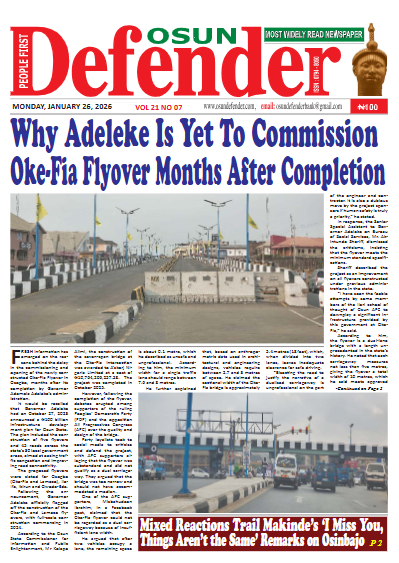OBSERVATION: What Manner Of Democracy!

BY YAYA ADEMOLA
ALTHOUGH, it continues to evolve, the term ‘Democracy’ came to life in the 5th Century BC in Athens, Greek City-State to connote “rule of the people.” That informed why Abraham Lincoln, on August 1, 1858 in his 272-word speech addressed to about 15,000 people at the Gettysburg National Cemetery in Pennsylvania in honour of those who died in America Civil War for the preservation of American union created in 1776 said, it was up to the living to ensure that the “government of the people, by the people, and for the people, shall not perish from the earth.”
Abraham Lincoln was an American lawyer and the 16th President of United States from 1861 until his assassination on 15th April, 1865. However, further studies queried the term, ‘people’ as it is vague. Rulers are not same people as the ruled; leaders are not same people as the led. Hence, democracy was redefined as “majority rule and protection of individual and minority rights.”In forms and content therefore, democracy is about majority of the people without alienating individual and minority rights; majority determine who rules through their majority vote. That is why in an electoral context, having fulfilled other stipulated criteria like spread of votes among others, a winner is declared by simple majority – highest number of votes cast for one candidate that exceeds the second-highest number while not constituting an absolute majority. In democracy therefore, electorate are the kings.
In Nigeria of today, Judiciary seems to have hijacked the traditional power of the electorate to electing the leaders of the society; no thanks to common disregards for procedures by politicians and political parties. There are three arms of government – legislature, executive and the judiciary. Legislature and executive are elected by the electorate while the judiciary is chosen through the recommendation of National Judicial Council (NJC) and approved by the executive.
Politicians and political parties, as they desperately seek to outsmart one another and in the process, compromise election through various malpractices such as use of thugs to snatch ballot boxes after voting which will cast a question mark on the final outcome of the electoral exercise. 2018 gubernatorial election in Osun readily comes as the first example.By the end of that election, PDP had 254,698 votes while APC had 254,345 votes. By simple majority, PDP had won by 353 votes. However, because of disruption of voting and snatching of ballot papers and boxes purely orchestrated by politicians, the election result was declared inconclusive by the electoral umpire, Independent National Electoral Commission (INEC). INEC was of the view that those electorate in seven different polling units and across four local government areas could not be denied their voting rights and that their number on the voter’s register was 3,498 which was far over and above the 353 difference; hence, a rerun. At the end of the rerun, APC was able to pull the string by defeating PDP while the PDP headed to court and here is the bottom-line. Although, the Apex court eventually proclaimed APC as the winner of the election, it could have gone either way, as witnessed the cofounding judgement at the first tribunal.
In the Saturday, 10th March, 2019 governorship election in Zamfara State, Muktar Idris of APC was declared winner by INEC, having secured 534,541 votes out of the 810,782 votes cast across the 14 local governments in the state while Bello Matawalle of PDP scored 189,452 votes, coming far behind but second. On the 24th May, 2019, Court of Appeal, Sokoto Division, ruled that APC did not conduct valid primaries for the 2019 general elections in the state and therefore nullified APC victory and handed the other candidate with the highest votes next to APC – PDP- the victory. That was how Bello Matawalle of the PDP emerged Zamfara State Governor from a distant second position. When the APC approached Supreme Court on the matter, it affirmed the Court of Appeal ruling by stating, “Candidate other than the 1st appellant with the highest votes stands elected. A cost of N10 million is awarded against the appellant.”
In Imo State March 2019 election, INEC declared Mr. Emeka Ihedioha of the PDP as the winner but the Supreme Court reversed the victory and declared Hope Uzodinma of APC as the Imo State Governor. The apex court said results of 388 polling units were unlawfully excluded during collation of the final governorship election result. Although, it did not provide details of votes scored by each of the candidates after the admittance of results from the said 388 polling units, the Supreme Court said Mr. Uzodinma scored the majority votes of the 388 units added.
From the cited cases above, two major problems afflicting our civil rule are: refusal of majority of the politicians to play by the rule by allowing party internal democracy; that refusal in turn culminate to conduct of invalid primaries with the use of thugs created by their maladministration in the first instance while their own children are doing well, mostly abroad. Most politicians see politics and polity as their personal estate and empire and would do anything to orchestrate electoral malpractices in desperation to hold on to power and winning at all cost. As long as the party faithful and the electorate in general fold their arms and allow these conditions to continue, Supreme Court will continue to technically play their role of electing leaders of their choice for the people. All their yeoman work of campaigning for their candidates; standing under the scorching sun and rain to cast their votes and monitor same will amount to nothing as court may be the ultimate decider.For genuine majority rule, not manifest through judicial interpretation of technicalities, the ball is in the court of the majority of the people to take ownership of the democratic process.








